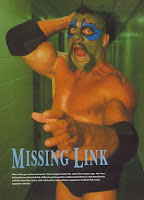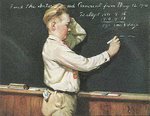Recently, I was having breakfast in Chicago with my friend Jeff, who was bringing me up to speed on the plans of a mutual friend. He explained that our friend was busying himself with the composition of a text that investigates the effect technology has on the self, but that he was confining his text to his own musings and the words on one particular philosopher. Jeff lamented that our friend, who is brilliant and insightful, is choosing not to include himself in the ongoing conversation about current technology and subject positions, instead opting to shape his writing through his interpretation of this one text. That got me thinking—considering how this class is always on my mind these days—about how the writing our friend is doing is a lot like a blog post without hyperlinks. Smartly linking our text to other texts not only adds depth to the ideas we are trying to convey, but links have become such an integral part to “reading” on the internet that the blogger who doesn’t link is looked upon with some suspicion.
bringing me up to speed on the plans of a mutual friend. He explained that our friend was busying himself with the composition of a text that investigates the effect technology has on the self, but that he was confining his text to his own musings and the words on one particular philosopher. Jeff lamented that our friend, who is brilliant and insightful, is choosing not to include himself in the ongoing conversation about current technology and subject positions, instead opting to shape his writing through his interpretation of this one text. That got me thinking—considering how this class is always on my mind these days—about how the writing our friend is doing is a lot like a blog post without hyperlinks. Smartly linking our text to other texts not only adds depth to the ideas we are trying to convey, but links have become such an integral part to “reading” on the internet that the blogger who doesn’t link is looked upon with some suspicion.
In fact, perhaps the most important reason to link to outside texts is to show that, perhaps unlike my friend, you are willing to acknowledge that you are taking part in a greater discussion. The more connection you can show between your ideas and outside texts, the more credence readers give your thoughts. To that end, links also serve as an immediate citation for the outside sources you bring to your work, sort of a documentation shortcut (although it is important not to rely on links alone when it comes to citing sources for hypertext essays). Connecting to other texts also gives readers the chance to continue their edification with additional resources, especially if the additional resources are more substantial in scope and research than the original. And sometimes links offer a deeper “showing” of a concept by connecting to a page with more detail or a visual or aural representation of that concept.
Linking is wonderful, but there are some caveats. First, linking doesn’t absolve us from quoting outside sources completely. We still should be prepared to offer short or even block quotes of important passages in the articles we refer to in our texts. We also need to remember not to go link-crazy. In “Link Theory: Keep it Simple, Pick Meaningful Words,” Steven Johnson quotes New York Times web site design director, Khoi Vinh, about a strong rule of the linking thumb:
This rule—that is to say, the act of creating hyperlinks itself—requires that we writers be prepared to recognize what is “meaningful text” in what we compose. Welcome to the lifelong struggle. I mean, really, isn’t determining what is “meaningful text” what the practice of composition is all about?
 bringing me up to speed on the plans of a mutual friend. He explained that our friend was busying himself with the composition of a text that investigates the effect technology has on the self, but that he was confining his text to his own musings and the words on one particular philosopher. Jeff lamented that our friend, who is brilliant and insightful, is choosing not to include himself in the ongoing conversation about current technology and subject positions, instead opting to shape his writing through his interpretation of this one text. That got me thinking—considering how this class is always on my mind these days—about how the writing our friend is doing is a lot like a blog post without hyperlinks. Smartly linking our text to other texts not only adds depth to the ideas we are trying to convey, but links have become such an integral part to “reading” on the internet that the blogger who doesn’t link is looked upon with some suspicion.
bringing me up to speed on the plans of a mutual friend. He explained that our friend was busying himself with the composition of a text that investigates the effect technology has on the self, but that he was confining his text to his own musings and the words on one particular philosopher. Jeff lamented that our friend, who is brilliant and insightful, is choosing not to include himself in the ongoing conversation about current technology and subject positions, instead opting to shape his writing through his interpretation of this one text. That got me thinking—considering how this class is always on my mind these days—about how the writing our friend is doing is a lot like a blog post without hyperlinks. Smartly linking our text to other texts not only adds depth to the ideas we are trying to convey, but links have become such an integral part to “reading” on the internet that the blogger who doesn’t link is looked upon with some suspicion.In fact, perhaps the most important reason to link to outside texts is to show that, perhaps unlike my friend, you are willing to acknowledge that you are taking part in a greater discussion. The more connection you can show between your ideas and outside texts, the more credence readers give your thoughts. To that end, links also serve as an immediate citation for the outside sources you bring to your work, sort of a documentation shortcut (although it is important not to rely on links alone when it comes to citing sources for hypertext essays). Connecting to other texts also gives readers the chance to continue their edification with additional resources, especially if the additional resources are more substantial in scope and research than the original. And sometimes links offer a deeper “showing” of a concept by connecting to a page with more detail or a visual or aural representation of that concept.
Linking is wonderful, but there are some caveats. First, linking doesn’t absolve us from quoting outside sources completely. We still should be prepared to offer short or even block quotes of important passages in the articles we refer to in our texts. We also need to remember not to go link-crazy. In “Link Theory: Keep it Simple, Pick Meaningful Words,” Steven Johnson quotes New York Times web site design director, Khoi Vinh, about a strong rule of the linking thumb:
"The important thing is to hyperlink meaningful text," says Vinh. "You're contributing to the overall semantic nature of the Web by linking meaningful text."
This rule—that is to say, the act of creating hyperlinks itself—requires that we writers be prepared to recognize what is “meaningful text” in what we compose. Welcome to the lifelong struggle. I mean, really, isn’t determining what is “meaningful text” what the practice of composition is all about?










